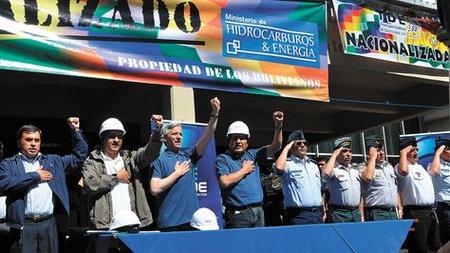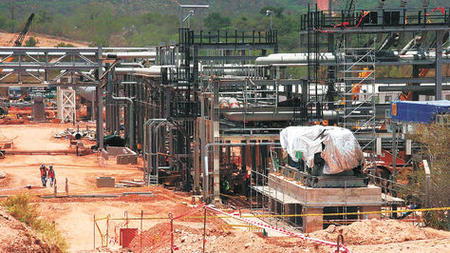
(above) May 1 nationalization. Credit: Fernando Cartagena, La Razón.
Nationalization, Bolivian Style: Morales Seizes Electric Grid, Boosts Oil Incentives
May 10, 2012 - NACLA
On May 1, President Evo Morales seized control of Bolivia's electric grid from a subsidiary of the Spanish-owned Red Eléctrica de España. In a dramatic ritual now familiar to Bolivians as a hallmark of the Morales government on International Workers' Day, Bolivian soldiers peacefully occupied the company's Cochabamba offices and draped the Bolivian flag across its entrance.
Coming on the heels of Argentina's recent move to expropriate Spanish energy company Repsol's majority stake in its national gas and oil company, the event has generated more than the usual volume of outrage and dire predictions of capital flight from U.S. business interests.
"It's crazy to invest in Bolivia, and this is a perfect example why," says Eric Farnsworth, vice-president of the DC-based Council of the Americas. "He's taking actions that guarantee that investment will dry up further."
"The left-wing populist strategy of demonizing the investor class has one big drawback: the law of diminishing (investor) returns," warns Mary Anastasia O'Grady in the Wall Street Journal.
(below) May 1 nationalization. Credit: Fernando Cartagena, La Razón.

In reality, far from abandoning Bolivia, foreign companies have remained actively engaged in its post- nationalization energy sector. This is due in no small part to Morales's increasingly investor-friendly policies, including his willingness to boost private incentives to meet domestic energy needs.
The takeover of the electric grid, which was privatized in 1997, is part of Bolivia's overall strategy to re-nationalize companies that were divested by past neoliberal governments, increasing state control over strategic sectors such as natural resources and basic services. Since 2006, Morales has nationalized the country's gas fields, oil refineries, pension funds, telecommunications, and main hydroelectric power plants.
According to Morales, Red Eléctrica has invested only $81 million in Bolivia's electric grid since acquiring it in 2002, while drawing around $100 million in cumulative profits. Three of Bolivia's nine departments remain isolated from the national network. "The government invested $220 million in electricity generation while others profited, so we're recovering what was ours," Morales said.
Apart from these ideological and economic considerations, domestic politics also played a role in the May 1 event. Nationalizations have been highly popular in Bolivia, and this one may help Morales shore up support from disaffected constituencies at a time of heightened civic unrest. Still, the increase in power blackouts since the government took over electricity generation in 2010 serves as a reminder that the move could also backfire politically if the level of service does not meet public expectations.
In any case, despite the theatrics of the May 1 announcement, Bolivia's most recent nationalization has been relatively non-confrontational, especially when compared to Argentina's move with Repsol. For one thing, the targeted electric company subsidiary generated just 3% of its parent company's profits, while Argentina's YPF accounted for 21% of Repsol's. In an effort to minimize negative fallout, Morales gave Spain 3 days notice of the takeover, whereas Argentina's President Cristina Fernández refused to meet with Repsol in advance.
After its initial criticism, Spain has acknowledged the legitimacy of Bolivia's nationalization decision, which includes a promise of fair compensation. Red Eléctrica expects to reach a friendly agreement with Bolivia on the value of its investment, and the parties have agreed to retain a joint appraiser.
(below) Credit: La Razón.

On the same day as the electricity grid takeover, Morales inaugurated a $600 million natural gas processing plant in eastern Bolivia with Repsol that represents the single biggest foreign investment under his government. The plant will triple the amount of gas sold to Argentina. Repsol is one of ten gas and oil multinationals that were forced to renegotiate their contracts with Bolivia in 2006, giving the state majority ownership and vastly increasing taxes and royalties under a relatively modest form of nationalization.
"We have a relation of great trust with Repsol," said Morales, contrasting Bolivia's situation with Argentina's. "Repsol respects all Bolivian rules, and its promised investments are going ahead in a good manner." At the same time, Morales noted, Bolivia's experience with Repsol shows that nationalization (Bolivian style) can be a success, providing an instructive example for Argentina.
As Carlos Arze of Bolivia's Center for Research on Labor and Agrarian Development (CEDLA) points out, six years after Bolivia nationalized its hydrocarbons reserves, not a single foreign oil and gas company has pulled out of Bolivia. Despite the major shift in revenue splits, the firms' annual profits have remained about the same in dollar terms ($824 million), due to the vast increase in revenues generated by high commodity prices and natural gas exports. Annual hydrocarbons revenues collected by the state have increased from an average of $332 million prior to nationalization to more than $2 billion today.
Still, there have been major setbacks with oil and gas nationalization. While natural gas production has increased, crude oil production has fallen by more than 20% since 2005. With crude oil prices that the state can pay frozen at $27 per barrel (less than a quarter of today's world price), companies are unwilling to invest in exploration of new reserves. As a result, Bolivia has become increasingly dependent on fuel imports for domestic consumption, with an escalating annual price tag estimated at $755 million in 2012, to subsidize the cost of imported gasoline and diesel to consumers.? Repsol gas processing plant. Credit: La Razón.
In an effort to reduce this dependency and stimulate energy sovereignty, the government instituted a new policy on April 19, boosting incentives for crude oil production from $10 to $40 per barrel (through a $30 tax credit).
The new policy effectively repositions the ill-fated December 2010 Gasolinazo, when the government tried to accomplish the same goals on the backs of consumers by abruptly cancelling the fuel subsidy and dramatically increasing gasoline prices. That policy was revoked after massive protests, sending shock waves through Bolivia's social and political sectors that continue to reverberate to this day.
Critics of the new incentive, including Arze, believe that it's just another form of giveaway to the oil companies which far exceeds their production costs, and will still be paid by the public through taxes foregone from the national treasury. They question where the funds will come from, since the government claims it can't afford higher salaries for striking health care workers and other disaffected sectors. According to the government, savings from reduced gasoline and diesel imports will more than offset the tax incentive cost (estimated at $358 million over five years).
In any case, it's clear that Bolivian-style nationalization is far from incompatible with continued private investment, and that the Morales government is willing to underwrite the incentives it believes are necessary to accommodate foreign capital. Whether this investor-friendly approach is the best policy for Bolivia remains to be seen, but it's a far cry from "demonizing" the private sector.